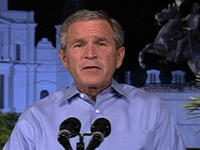Jackson Square?
 The President addressed the nation this evening from Jackson Square in New Orleans.
The President addressed the nation this evening from Jackson Square in New Orleans.Commemorating the Battle of New Orleans, in which Andrew Jackson punished the British late in 1814 (some weeks after the Treaty of Ghent had ended the War of 1812), one must wonder at the choice of venue.
Jackson, of course, had met in late April of 1805 with Aaron Burr, and pledged his support for Burr's enterprise to wrest control of Mexico from the degenerate Spanish dons. If successful, the coup would have placed the vital Mississippi River in American (albeit not Virginian) hands. Jackson believed it wise to associate himself with the man likely to shortly be proclaimed Emperor of Mexico.
 Jackson's recollection of events became, shall we say, "unreliable" when Mr. Jefferson hit upon the notion of eliminating his political rival by trumping up treason charges against Burr. So desperate was Jefferson to destroy Burr by any means necessary, he stooped to make common cause with General James Wilkinson, later ineluctably established to be in the pay of the King of Spain (as "Agent No. 13"). Wilkinson, as a companion of Burr during the Revolution, had passed himself off as a friend to those seeking to liberate Mexico. Though Burr was acquitted in a trial presided over by Chief Justice Marshall, Jefferson's conspiracy was nonetheless successful, and Burr's political power broken.
Jackson's recollection of events became, shall we say, "unreliable" when Mr. Jefferson hit upon the notion of eliminating his political rival by trumping up treason charges against Burr. So desperate was Jefferson to destroy Burr by any means necessary, he stooped to make common cause with General James Wilkinson, later ineluctably established to be in the pay of the King of Spain (as "Agent No. 13"). Wilkinson, as a companion of Burr during the Revolution, had passed himself off as a friend to those seeking to liberate Mexico. Though Burr was acquitted in a trial presided over by Chief Justice Marshall, Jefferson's conspiracy was nonetheless successful, and Burr's political power broken.Jackson continued his habit of political chicanery in the disputed election of 1824. John Quincy Adams, author of the "Monroe" Doctrine, was the obvious successor to James Monroe, last of the Virginia Junta presidents. Jackson capitalized on Adams' controversial abolitionist sentiments and managed to so poison the air that students of American history are, to this day, lectured about the "corrupt bargain" that brought Adams to the presidency. Jackson's complaints, foreshadowing Al Gore's selfish rage in 2000, undermined the legitimacy of the system, and questioned the constitutional process.
Jackson, of course, prevailed in 1828, ushering in a succession of weak presidents. Only the establishment of the Republican Party -- with abolition as its central tenet -- and the election of Abraham Lincoln in 1860, delivered the United States from the grasp of the corrupt slave power of the Jeffersonian Democrats.
Mr. Bush would do well in the future to consult with reliable students of American history before selecting the backdrop for major speeches.

Comments on "Jackson Square?"
post a comment